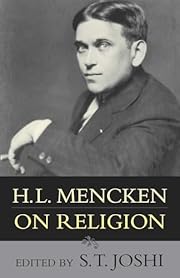

Klik op een omslag om naar Google Boeken te gaan.
|
Bezig met laden... H.L. Mencken on Religiondoor H. L. Mencken
 Geen Bezig met laden...
Meld je aan bij LibraryThing om erachter te komen of je dit boek goed zult vinden. Op dit moment geen Discussie gesprekken over dit boek. When Mencken lets loose his pen on the subject of religion, fur will fly. He pulls very few punches, and even when he describes religious people favorably, you always have the sense there is an ironic edge to his words. The scary thing about this book is how easily it could have been written today, with only a few name changes. His arguments remain cogent and relevant even with the passage of 3 generations. One gets the sneaking suspicion he would not be at all surprised at the presidency of George W. Bush, or the fact that Michelle Bachman, Mike Huckabee, and Rick Perry are all considered viable candidates for president. geen besprekingen | voeg een bespreking toe
"The great majority of these writings (gathered from the newspapers and magazines in which they originally appeared) have never been reprinted, and they present a far broader picture of Mencken's stance on religion than can be found in his well-known 'Treatise on the Gods' (1930)"--Jacket.No one ever argued more forcefully or with such acerbic wit against the foolish aspects of religion as H. L. Mencken (1880-1956). As a journalist, he gained national prominence through his newspaper columns describing the now-famous 1925 Scopes trial, which pitted Fundamentalists against a public school teacher who dared to teach evolution. But both before and after the Scopes trial, Mencken spent much of his career as a columnist and book reviewer lampooning the ignorant piety of gullible Americans. S. T. Joshi has brought together and organized many of Mencken's writings on religion in this provocative and entertaining collection. The articles here presented demonstrate that Mencken canvassed the entire range of religious phenomena of his time, from evangelists Billy Sunday and Aime Semple McPherson, to Christian Scientists, and theosophists and spiritualists. On a more serious note are his discussions of the philosophy of Friedrich Nietzsche and the scientific worldview as a rival to religious belief. Also included are poignant autobiographical accounts of Mencken's own upbringing and his core beliefs on religion, ethics, and politics. If anything was sacred to Mencken, it was the right to speak one's mind freely, and many of his attacks are directed against those true believers who he felt tried to foist their beliefs on others to stifle independent thinking. For everyone who values freethought and sharp intelligence, this collection of articles by America's premier iconoclast is a must. Geen bibliotheekbeschrijvingen gevonden. |
Actuele discussiesGeen
 Google Books — Bezig met laden... Google Books — Bezig met laden...WaarderingGemiddelde: (4.44) (4.44)
Ben jij dit?Word een LibraryThing Auteur. |
||||||||||||||||||||||||||||||||||||||||||||||||||||||||||||||||||||||||||||||||||||||||||||||||||||||||||||||||||||||||
While unpersuaded regarding metaphysical verities, Mencken in these writings never argues for atheism outright. In fact, he pleads for "religious" functions stripped of theological baggage in his fine essay on "Services for the Damned" (78 ff.). He is also willing to credit the great poetic power found in such places as the King James Bible and the Book of Common Prayer, as descended from the poetry of the ancient Hebrew texts (64). He further opines that the poetic force in scripture and liturgy had allowed religion to survive its own intellectual bankruptcy and would continue to do so.
The largest section of the book is dedicated to Mencken's first-hand reportage on the Scopes Monkey Trial in Dayton, Tennessee. In his first writing on the topic, Mencken held out for the regulatory authority of the state over rogue pedagogues, no matter how benighted that state's decision might be. Quickly, however, he developed a clear revulsion for William Jennings Bryan and the Fundamentalist cheerleaders for the prosecution. With the event of Bryan's death just after the verdict, Mencken's writing passed into impressively hostile obituary concerning a man who "couldn't be President, but he could at least help magnificently in the solemn business of shutting off the presidency from every intelligent and self-respecting man" (223).
Twenty-first century readers are likely to be taken aback at first by Mencken's repeated references to the "darkies" of the American South and his own Baltimore. His clearest positions on race relations are however set forth in some of the last essays collected here, where he earnestly remarks himself as "a sincere friend of the colored people .... In many and obvious ways they are superior to the whites against whom they are commonly pitted. They are not only enormously decenter; they are also considerably shrewder" (285). In a different, earlier "Venture into Therapeutics" he even suggested with startling prescience that Islam would be a desirable tonic for African-American culture (269 ff.)
Joshi very helpfully provides a glossary of names which Mencken drops and hurls, but whose now expired contemporaneity will make them obstacles to today's reader, and he supplies the text of biblical citations that would otherwise go unappreciated by most readers without scripture at their elbows. Joshi makes a few misses in his efforts to clarify Mencken's cultural references though, such as mis-identifying "September Morn" as "a translation of a German song ... by Joseph Marx" (305), rather than the scandal-provoking painting by Paul Émile Chabas. Joshi would have been better off not to note "The Girl with the Whooping Cough" as "unidentified, possibly fictitious" (273, 305) when it was an actual stage comedy suppressed on Broadway in 1910. Still, his work in organizing and presenting this material is good on the whole, and I'm in debt to his editorial labors for my chance to read this book.